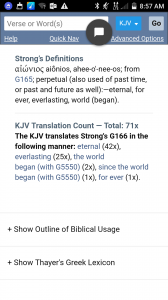Note Vincent does not know what "aionios" describes. He offers two possibilities. If he does not know this how can we trust that he "knows" the other things he states as fact?
Hermann Sasse says re "D. The Personification of Aion" that the "idea of a personal Aion...so important in Hellenistic syncretism is alien to the NT. It may perhaps be found only in Eph.2:2..." ("Theological Dictionary of the New Testament", Vol. 1, p.207, editor, Gerhard Kittel).
Because TDNT doesn't know whether or not Eph.2:2 should be classified under section D, does that mean we shouldn't trust anything else in the 10 volume set?
BDAG lists under this same category, "4 the Aeon as a person" three Scripture references: "Eph 2:2. The secret hidden from the Aeons Col 1:26; Eph 3:9..." ("A Greek-English Lexicon of the New Testament & Other Early Christian Literature", p.33).
At least one of the above 2 lexicons is simply - flat out wrong - re Aeon personified. Which one do you think it is? Is TDNT wrong? Or is BDAG wrong? Or both of them? To use your type of comment above, since at least one of these lexicons is clearly wrong, how can we trust anything else they state?
The LSJ lexicon lists Eph.3:9, but not under aion personified as BDAG does. So which is wrong, LSJ or BDAG? Which of the two should we not trust? (See The Liddell and Scott Greek–English Lexicon (9th edition, 1940), p.45).
Thayer's lexicon, p.19, lists Eph.3:9 & Col.1:26 in terms of ages of time, not Aeons personified as BDAG does. So which is wrong, Thayer or BDAG? Which of the two should we not trust with anything they say, & throw in the trash?
The BDAG lexicon is opposed to the above 3 sources & others. Which should we not trust? Thayer, LSJ & TDNT, etc? Or BDAG?
Wrong as usual! Do you verify every reference in every lexicon, grammar, dictionary etc. you consult? Neither do I nor anyone else that I know of. Because those are accredited peer reviewed reference works. They would not have the trust and reputations they have if their citations were not accurate.
Accurate? Ooops. I have just shown that they are not "accurate".
Maybe you should start checking those "references".
How many thousands of errors did you say Strongs had?
"Peer reviewed"? You've never provided any reviews, whether critical or back patters. Here are some reviews:
"Baldwin’s use of the lexicons as authoritative raises the question: Do the lexicons provide authoritative boundaries for the meaning and glosses of αὐθεντέω in the various contexts? Lee, Nida and Louw are agreed that the answer is ‘no’, not only for αὐθεντέω, but in general. Lee asserts, ‘The body of attestations accumulated in the lexicons has reached its greatest extent yet. But because of the ways it has been gathered there is an inherent unreliability’ (Lee, Lexicography, p. 124). Nida and Louw write: ‘We must not assume that the English glosses in a Greek–English lexicon can provide accurate information about the designative and associative meanings of a Greek term’ (Nida and Louw, Lexical Semantics, p. 59)"
http://jgrchj.net/volume10/JGRChJ10-7_Westfall.pdf
"No one has drawn more attention to the methodological issues and, well, let's face, flaws, in our New Testament Greek lexicons that John A. L. Lee. In a good summary statement of the state of affairs of our lexicons, Lee says "The concise, seemingly authoritative statement of meaning can, and often does, conceal many sins - indecision, compromise, imperfect knowledge, guesswork, and, above all, dependence on predecessors."
Lee is quoted again: "...NT lexicons are contaminated by glosses from the standard translations, going back as far as the Vulgate."
Advances in the Study of Greek
"The first three chapters chronicle the three leading characteristics of the NT lexicographical tradition: reliance on predecessors, employment of the gloss method, and dependence on versions. Lee demonstrates how lexicographers in their choice of glosses frequently drew on the rendering of a given word in current translations and shows the chain of development from the kjv to Tyndale, from Tyndale to Luther, and from Luther via Erasmus to the Vulgate. He also points to the limitations of the gloss method and advocates a definition approach instead... Hence even BDAG (2000) is but the last in a series of works with a long, checkered pedigree that should now give way to new efforts..."
http://www.etsjets.org/files/JETS-PDFs/47/47-3/47-3-pp481-547_JETS.pdf
The Curious Case of Gerhard Kittel, the Nazi lexicographer:
The Curious Case of Gerhard Kittel
Myth: Biblical Reference Works Are Objective
Myth: Biblical Reference Works Are Objective (Gupta)
" Lee goes on to say that lexicographical work in Greek – especially the vocabulary of the LXX – is far from over not just in terms of demand, but in terms of accuracy. There is a huge amount of sources not yet incorporated into our understanding of Koine Greek. Undertaking exhaustive and integrative analysis of this body of language is therefore essential to interpreting Scripture rightly."
Lexicography for the Church
"Recent studies have...demonstrated the inadequacies of many of the standard Greek lexicons, including Bauer & Dankers:"
Christian Identity in Corinth
Christian Identity in Corinth: A Comparative Study of 2 Corinthians ...By V. Henry T. Nguyen

